 Headline News
Headline News
Bush goes back on tour
(CNS): The country’s premier is leaving the Cayman Islands this weekend on another international tour where he will be promoting the islands at a series of meetings and conferences over the next two weeks. The world trip includes talks with the Florida Caribbean Cruise Association (FCCA) in Miami, a United Nations conference in New York, the OECD Global Forum in Singapore, the opening of a Cayman office in Hong Kong and a Commonwealth Financial Ministers Conference in Washington. With the deputy premier still at the CPA conference in Kenya until 25 September, Education Minister Rolston Anglin will act as the country’s premier next week.

Mac has eye on Asian pie
 (CNS): The Cayman Islands should be able to benefit from the growth of economies in the Far East but the country has been slow to recognise the shift of business from the west to the east, the premier has said. McKeeva Bush has announced that he will be travelling to Singapore and other countries next week in order to promote Cayman as a potential business jurisdiction as well as a tourist destination and tap into the growing economies there. Pointing to China in particular, Bush said it was second largest economic power in the world and Cayman had to form a relationship with that nation because before long its economy would overtake that of America.
(CNS): The Cayman Islands should be able to benefit from the growth of economies in the Far East but the country has been slow to recognise the shift of business from the west to the east, the premier has said. McKeeva Bush has announced that he will be travelling to Singapore and other countries next week in order to promote Cayman as a potential business jurisdiction as well as a tourist destination and tap into the growing economies there. Pointing to China in particular, Bush said it was second largest economic power in the world and Cayman had to form a relationship with that nation because before long its economy would overtake that of America.
During his trip to Asia the premier said he would be promoting the Cayman Islands as a business friendly, sensibly regulated jurisdiction as part of government efforts to encourage new business to Cayman. “The window of opportunity is short as there are numerous businesses considering moving some of their activities to other jurisdictions, of which we wish to be one, and at the same time there are numerous businesses in Cayman considering other locations,” he warned.
“Over the last 16 months we have worked diligently to improve and correct our international image,” he added. “We have strengthened incentives which will encourage persons relocating from other major countries to consider the Cayman Islands as an acceptable place to establish and maintain their businesses.”
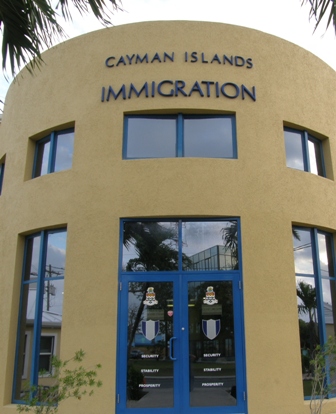
Premier says rollover gap can be cut
 (CNS): The premier told the country on Thursday night that he has legal advice from the UK which says the Cayman Islands government can make the rollover as short as it chooses and he will be examining changes to the immigration policy. Speaking to the country during a television address, McKeeva Bush raised the issue of immigration and the need to attract people to the Cayman Islands as well as the need to encourage people to keep their earnings here. He said that Cayman was exporting part of its GDP as a result of the way the country’s immigration policy encouraged foreign workers to send money out of Cayman. He said any country which exported its GDP was doomed to failure.
(CNS): The premier told the country on Thursday night that he has legal advice from the UK which says the Cayman Islands government can make the rollover as short as it chooses and he will be examining changes to the immigration policy. Speaking to the country during a television address, McKeeva Bush raised the issue of immigration and the need to attract people to the Cayman Islands as well as the need to encourage people to keep their earnings here. He said that Cayman was exporting part of its GDP as a result of the way the country’s immigration policy encouraged foreign workers to send money out of Cayman. He said any country which exported its GDP was doomed to failure.
Jury says 3 men are guilty
(CNS): Full story — Patrick McField, Osbourne Douglas and Brandon Leslie-Ebanks have all been found guilty of the murder of Omar Samuels in McField Lane, George Town on 5 July. The verdict was returned just before 4:00pm this afternoon (Thursday 16 September) to a courtroom filled with friends and family of the defendants. When the unexpected verdict was delivered by the foreman, the families of the three men broke down in shock and grief at the result. The judge took a short adjournment after the jury’s verdict was delivered before pronouncing the mandatory life sentence on all three defendants as the men’s families wept in the public gallery. (Photo courtesy of News27)
The defence teams said they were unable to comment on the verdict but each one confirmed that they would be filing appeals as soon as possible on behalf of their respective clients.
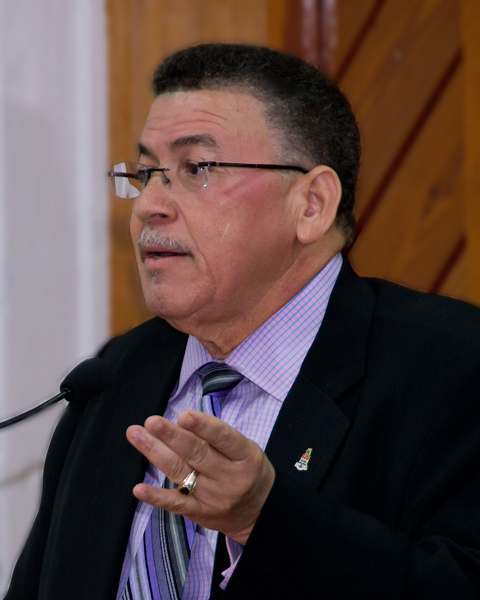
Mac berates bureaucrats
 (CNS): The country’s premier has taken another swipe at the bureaucracy that he says is hampering his efforts to get the country’s economy back on track. He described the bureaucracy as “silent, passive non-compliance” and a “dragging of feet” when people were opposed to government projects. Although he did not call out the civil service directly, he implied that it was within the government mechanism that he was encountering the problems that prevented him from getting what he wanted done. McKeeva Bush raised the issue at a George Town public meeting on Wednesday night as he talked about the current state of the economy and efforts to turn things around. He warned the audience, in which there were a number of public servants, that he was going to stop it. (Photo Dennie WarrenJr)
(CNS): The country’s premier has taken another swipe at the bureaucracy that he says is hampering his efforts to get the country’s economy back on track. He described the bureaucracy as “silent, passive non-compliance” and a “dragging of feet” when people were opposed to government projects. Although he did not call out the civil service directly, he implied that it was within the government mechanism that he was encountering the problems that prevented him from getting what he wanted done. McKeeva Bush raised the issue at a George Town public meeting on Wednesday night as he talked about the current state of the economy and efforts to turn things around. He warned the audience, in which there were a number of public servants, that he was going to stop it. (Photo Dennie WarrenJr)
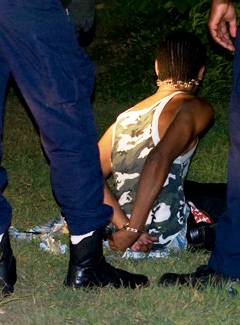
Cops clear up 8 robberies
 (CNS): Of the more than forty armed robberies that have taken place in Grand Cayman this year so far, the police have revealed that they have charged people in only eight of the incidents. Since January, gas stations, liquor stores, fast food joints, grocery stores and homes have all fallen victim to armed villains. Cash, wallets, phones, even pizzas and sodas have been stolen at knife and gun point by a mixture of robbers. Men and women, girls and boys, Caymanians and foreign nationals have used, or threatened to use, violence in the execution of the crimes which have shocked the community. So far, seven men, two teenage boys and three teenage girls have been charged with robbery and are are now going though the court system (Photo Dennie Warren jr)
(CNS): Of the more than forty armed robberies that have taken place in Grand Cayman this year so far, the police have revealed that they have charged people in only eight of the incidents. Since January, gas stations, liquor stores, fast food joints, grocery stores and homes have all fallen victim to armed villains. Cash, wallets, phones, even pizzas and sodas have been stolen at knife and gun point by a mixture of robbers. Men and women, girls and boys, Caymanians and foreign nationals have used, or threatened to use, violence in the execution of the crimes which have shocked the community. So far, seven men, two teenage boys and three teenage girls have been charged with robbery and are are now going though the court system (Photo Dennie Warren jr)
Workers returning soon to school site
(CNS): Following the announcement by the education minister that the construction management contract on the two public high schools has been awarded to a local consortium of companies, workers are expected to return to the site in significant numbers in a matter of weeks. One local subcontractor said the most important next step in the process was for the new construction manager (CM) to figure out a schedule which will dictate the manning levels at thesite and get people back to work. Speaking in the Legislative Assembly this morning, Rolston Anglin said he expected work at the site to be fully mobilized within 30 days.
Allen Roffey of Caribbean Mechanical congratulated government on finalizing the tender and said he was looking forward to seeing the project back on rack. He said his firm had continued to do a considerable amount of work on the sites during the period since work officially stopped almost one year ago.
The announcement that the Central Tenders Committee had accepted the recommendation of the ministry on the bid from the local company made up of McAlpine, DECCO Ltd and Arch & Godfrey was made in the Legislative Assembly this morning.
The contract was a re-tender and it is worth just under $2.3 million, which the minister said represented the best value for money for government. This contract is awarded following revised plans for the schools project, which will see them finished over a phased period.
The consortium had put in a bid for the original tender but had been one of the most expensive bids. However, at that time the consortium included Hadsphaltic which has since gone into receivership.
With the contract now sorted Anglin said this not only had positive implications for the construction of the two government high schools, it was also good news for the local construction industry. “This award will stimulate the local construction industry, as contracts will be let for various works. It is the intention to sub-contract as many small construction packages as possible, with the aim of maximizing opportunity for the local contractors,” he stated.
He said his ministry, unlike his predecessor, had obligated the contractor to use local subcontractors who employed Caymanians and that the government would be monitoring staff lists of those working on the project to make sure that unemployed Cayman construction workers would be employed.
The Clifton Hunter site in Frank Sound will be the first of the two schools to be completed and the construction manager will assume responsibility for supervising the trade contractors and the day-to-day construction activities at both sites, which will, at that point, be increased to levels necessary to complete the projects. He explained that work at John Gray will focus on particular buildings which educators have prioritized.
Aside from the work undertaken by Caribbean Mechanical and other smaller jobs that have been undertaken to maintain the sites the school projects have been stopped for ten months.
The original general contractor Tom Jones International walked off the job in November 2009. The government is now engaged in what is likely to be an expensive and lengthy legal fight with the contractor. In the first round of the court room battle last month government wholly failed in its attempts to have TJI’s legal claim against it thrown out and was forced to pay costs.

Civil liberties under attack
 (CNS): The combination of the forthcoming enactment of the police bill, further changes to the Court of Appeal bill and other recent legislative changes have been criticised in the wider community as undermining civil liberties. George Town MLA MLA Alden McLaughlin told the Legislative Assembly that there was an “emerging trend” in changes to legislation that appeared to be designed to strengthen the hand of the prosecution and give the crown a better chance at conviction. McLaughlin pointed out that this ran counter to the principle that the state is already more powerful than the accused, and was now making it even more difficult for people to defend themselves.
(CNS): The combination of the forthcoming enactment of the police bill, further changes to the Court of Appeal bill and other recent legislative changes have been criticised in the wider community as undermining civil liberties. George Town MLA MLA Alden McLaughlin told the Legislative Assembly that there was an “emerging trend” in changes to legislation that appeared to be designed to strengthen the hand of the prosecution and give the crown a better chance at conviction. McLaughlin pointed out that this ran counter to the principle that the state is already more powerful than the accused, and was now making it even more difficult for people to defend themselves.
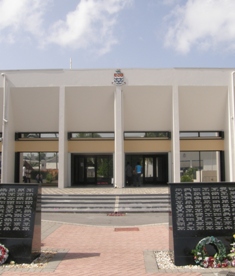
Jury must acquit, says lawyer
 (CNS): The crown’s evidence is insufficient to warrant a conviction in the case against Brandon Leslie-Ebanks and his co-defendants, Osbourne Douglas and Patrick McField, for the murder of Omar Samuels, the jury was told on Tuesday by Nicholas Rhodes QC, who said, as he made his closing statement, that they must acquit. The trial of the three men for that crime is now complete and the judge in the case, Justice Charles Quin, began his summing up on Wednesday morning. In the final closing statement on Tuesday, Rhodes said the crown’s key witnesses had lied and forreasons that may never be known had chosen to frame his client and his co-defendants.
(CNS): The crown’s evidence is insufficient to warrant a conviction in the case against Brandon Leslie-Ebanks and his co-defendants, Osbourne Douglas and Patrick McField, for the murder of Omar Samuels, the jury was told on Tuesday by Nicholas Rhodes QC, who said, as he made his closing statement, that they must acquit. The trial of the three men for that crime is now complete and the judge in the case, Justice Charles Quin, began his summing up on Wednesday morning. In the final closing statement on Tuesday, Rhodes said the crown’s key witnesses had lied and forreasons that may never be known had chosen to frame his client and his co-defendants.
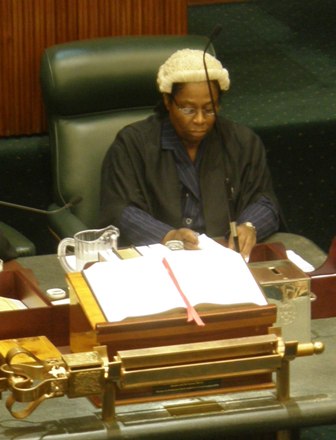
Ethics body hits early hurdles
 (CNS): Although only a few months old, the Commission for Standards in Public Life (CSPL) has already encountered a number of hurdles preventing it from doing what it is supposed to do when it comes to supervising public ethics. Its primary role is to monitor the potential for corruption and conflict of interest among politicians and public servants, but according to its first report it needs a law to ensure compliance. The commission revealed that in an attempt to examine the register which requires politicians to declare their business interests it found no reports had been made by the Legislative Assembly clerk and a select committee created to deal with issues relating to the Register of Interests has never met.
(CNS): Although only a few months old, the Commission for Standards in Public Life (CSPL) has already encountered a number of hurdles preventing it from doing what it is supposed to do when it comes to supervising public ethics. Its primary role is to monitor the potential for corruption and conflict of interest among politicians and public servants, but according to its first report it needs a law to ensure compliance. The commission revealed that in an attempt to examine the register which requires politicians to declare their business interests it found no reports had been made by the Legislative Assembly clerk and a select committee created to deal with issues relating to the Register of Interests has never met.